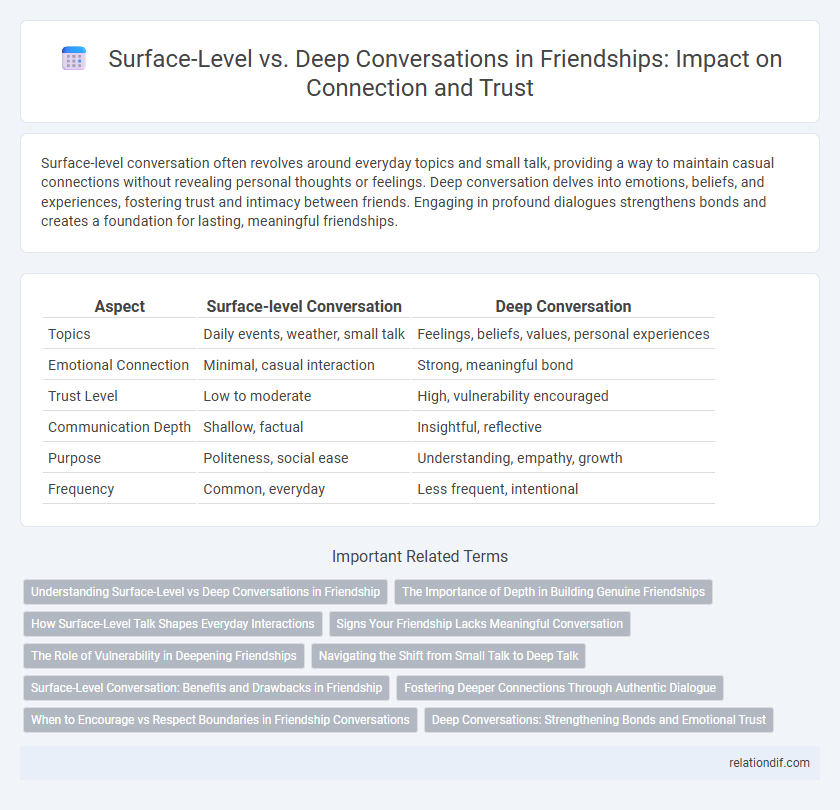Surface-level conversation often revolves around everyday topics and small talk, providing a way to maintain casual connections without revealing personal thoughts or feelings. Deep conversation delves into emotions, beliefs, and experiences, fostering trust and intimacy between friends. Engaging in profound dialogues strengthens bonds and creates a foundation for lasting, meaningful friendships.
Table of Comparison
| Aspect | Surface-level Conversation | Deep Conversation |
|---|---|---|
| Topics | Daily events, weather, small talk | Feelings, beliefs, values, personal experiences |
| Emotional Connection | Minimal, casual interaction | Strong, meaningful bond |
| Trust Level | Low to moderate | High, vulnerability encouraged |
| Communication Depth | Shallow, factual | Insightful, reflective |
| Purpose | Politeness, social ease | Understanding, empathy, growth |
| Frequency | Common, everyday | Less frequent, intentional |
Understanding Surface-Level vs Deep Conversations in Friendship
Surface-level conversations in friendship involve casual topics like weather or daily routines, creating initial comfort but limited emotional connection. Deep conversations explore personal values, fears, and aspirations, fostering trust and genuine understanding between friends. Recognizing the distinction helps build stronger, more meaningful friendships through intentional communication.
The Importance of Depth in Building Genuine Friendships
Surface-level conversations often revolve around small talk and everyday topics, which can create a sense of familiarity but rarely foster true emotional connection. Deep conversations involve sharing personal experiences, values, and feelings, enabling trust and vulnerability to flourish between friends. Prioritizing meaningful dialogue strengthens bonds and cultivates genuine friendships that endure beyond casual interactions.
How Surface-Level Talk Shapes Everyday Interactions
Surface-level conversation establishes a foundation of comfort and familiarity that facilitates smooth everyday social interactions, enabling people to share pleasantries and navigate social norms effortlessly. These exchanges often include topics like weather, hobbies, or current events, which serve as social lubricants promoting connection without vulnerability. Regular engagement in surface-level talk helps maintain relationships by creating a consistent pattern of communication and positive social reinforcement.
Signs Your Friendship Lacks Meaningful Conversation
Friendships that rely heavily on surface-level conversation often lack emotional depth and genuine connection, evident when interactions revolve only around small talk or daily routines without exploring feelings or personal values. A clear sign is the absence of vulnerability, where both parties avoid discussing important topics or sharing challenges, leading to a sense of distance despite frequent communication. Consistently shallow exchanges can cause one or both friends to feel unfulfilled, signaling a need for more meaningful, open dialogue to strengthen the bond.
The Role of Vulnerability in Deepening Friendships
Vulnerability plays a crucial role in deepening friendships by allowing individuals to share their true thoughts and emotions beyond surface-level conversation. When friends express genuine feelings and personal experiences, trust strengthens and emotional intimacy grows, fostering a more meaningful connection. This openness transforms interactions from casual exchanges to profound support systems essential for lasting relationships.
Navigating the Shift from Small Talk to Deep Talk
Navigating the shift from surface-level conversation to deep conversation involves recognizing emotional cues and timing moments of vulnerability to build trust and connection. Small talk establishes comfort and mutual understanding, while deep talk fosters meaningful bonds by exploring personal values, experiences, and feelings. Mastering this transition enhances friendship quality and promotes emotional intimacy.
Surface-Level Conversation: Benefits and Drawbacks in Friendship
Surface-level conversations in friendship foster initial bonding by enabling comfortable, low-risk exchanges that build trust and rapport. They offer benefits such as ease of communication, maintaining social harmony, and providing opportunities for light-hearted interaction. However, reliance on surface-level dialogue can hinder emotional intimacy, limit understanding, and prevent the development of deeper connections necessary for long-lasting friendships.
Fostering Deeper Connections Through Authentic Dialogue
Surface-level conversations often revolve around casual topics such as weather or daily routines, limiting emotional connection between friends. Engaging in deep conversations requires vulnerability and authenticity, allowing individuals to share personal experiences, values, and emotions. Fostering deeper connections through authentic dialogue enhances trust, empathy, and long-lasting friendship bonds.
When to Encourage vs Respect Boundaries in Friendship Conversations
Surface-level conversations help establish comfort and trust early in friendships by focusing on shared interests and everyday topics. Encouraging deeper conversations is appropriate when both parties show openness and emotional readiness, fostering authentic connection and vulnerability. Respecting boundaries means recognizing signs of discomfort or reluctance, allowing space for gradual trust-building without pressure to disclose personal information prematurely.
Deep Conversations: Strengthening Bonds and Emotional Trust
Deep conversations foster emotional trust and strengthen bonds in friendships by encouraging vulnerability and authentic sharing. Engaging in meaningful dialogue allows individuals to understand each other's values, fears, and dreams, creating a foundation of empathy and mutual respect. These profound interactions enhance connection quality beyond surface-level exchanges, promoting lasting and resilient friendships.
Surface-level conversation vs Deep conversation Infographic

 relationdif.com
relationdif.com